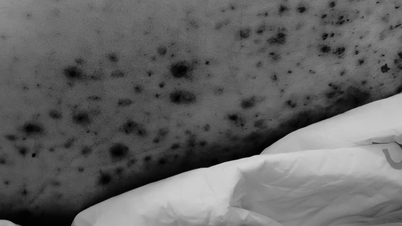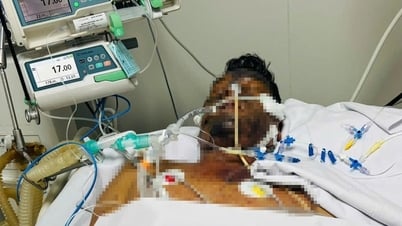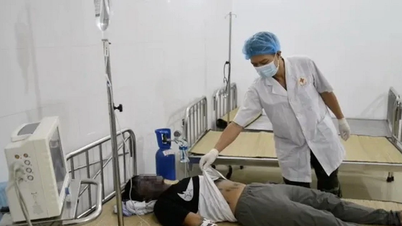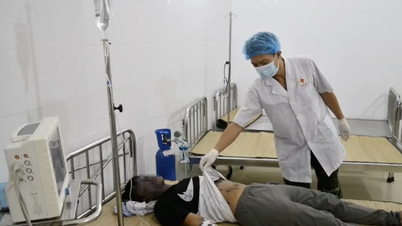Recently, the Pediatrics Department, Central Hospital for Tropical Diseases received two newborn patients with chickenpox. Notably, both patients were infected by their mothers.
The first case is a 5-day-old baby boy in Hanoi . His mother discovered she had chickenpox on the third day after giving birth and immediately isolated her child.
 |
| Doctors are taking care of children with chickenpox at the Central Tropical Hospital. |
However, on the 5th day after birth, the baby began to show signs of chickenpox such as rash and blisters all over the body.
Luckily, the baby is doing well because he is feeding normally and has no complications. Currently, the rash has almost completely disappeared and no new rashes have appeared.
The second case is a 2-month-old boy in Hanoi. 3 days before being admitted to the hospital, blisters began to appear and spread all over his face and body, accompanied by coughing and wheezing. The blisters appeared in large numbers and spread quickly and densely. The baby had a fever of 38 degrees Celsius and was taken to the hospital by his family.
Upon admission, the baby had pneumonia, accompanied by a multi-form, multi-age, blister-like rash all over the body. The baby was given antibiotics, antiviral drugs, and aerosols. Currently, the baby's old rash has shrunk, no new rash has grown, and the bronchopneumonia has stabilized.
Dr. Le Thu Trang, Department of Pediatrics, Central Hospital for Tropical Diseases, explained that chickenpox is an infectious disease that causes an epidemic. The disease is transmitted through the respiratory tract. Clinically, the disease manifests as fever, rash, blisters on the skin of many ages, and itchy rash.
Most of the diseases are usually benign, however there can be some complications such as infected dermatitis, encephalitis, pneumonia, myocarditis, nephritis, arthritis and often occur in special conditions such as people with immunodeficiency (cancer patients, chemotherapy patients, immunosuppressants), infants, young children, and people with chronic diseases.
The incubation period for chickenpox is usually 10-14 days. Chickenpox is contagious while the rash is still present.
Newborns with chickenpox need to be hospitalized early for monitoring and timely treatment to avoid dangerous complications that can affect the child's life such as hepatitis, pneumonia or encephalitis due to the child's weak resistance.
Doctor Trang recommends that when discovering that a newborn baby has chickenpox, parents should take their child to a medical facility for examination early and should not self-treat at home.
If a mother gets chickenpox while breastfeeding, she needs to clean her hands regularly and wear a mask to avoid the bacteria spreading directly through droplets (talking, coughing, sneezing) or fluid from blisters.
Especially when detecting children
Dr. Trang emphasized that varicella vaccination is the most effective and long-term measure to prevent chickenpox. For children, varicella vaccination is even more important. Families should take their children to reputable vaccination facilities for consultation and vaccination according to current regulations.
When in contact with someone who has chickenpox and has not been vaccinated against chickenpox, vaccination should be given within 5 days. The patient should be isolated to avoid infecting family members and the community.
Dr. Nguyen Tuan Hai, Safpo/potec vaccination system, said that many scientific evidences show that the vaccine helps prevent or reduce the severity of the disease if injected within 3-5 days after exposure. In particular, the vaccine's effectiveness can reach 70-100% if injected within 72 hours.
Doctor Tuan Hai recommends that children should be vaccinated to create active immunity against chickenpox.
To reduce the risk of infection, you should avoid close contact with caregivers or people with chickenpox. If you suspect you have the disease, it is best to go to a medical facility for early examination and diagnosis.
When children have chickenpox, parents need to note that in addition to reducing fever and taking medication as prescribed, taking care of skin lesions is very important.
If skin damage is not properly cared for and becomes infected, the scar will be very ugly and can become infected, causing infection in other organs.
Patients need to keep the blisters clean, can use antiseptic if infected; absolutely do not apply medicine of unknown origin on blisters. Chickenpox does not limit bathing, on the contrary, the cleaner the body, the better.
Regarding nutrition, people with chickenpox need to eat properly, with adequate nutrients suitable for their age, and drink plenty of water.
During the care process, if there is a persistent high fever that cannot be reduced along with neurological signs such as lethargy, difficulty waking up, vomiting, convulsions, difficulty breathing, etc., the patient needs to be taken to a medical facility promptly.
Source: https://baodautu.vn/canh-bao-lay-truyen-thuy-dau-tu-me-sang-tre-so-sinh-d220017.html





![[Photo] Prime Minister Pham Minh Chinh chairs a meeting of the Government Standing Committee to remove obstacles for projects.](https://vphoto.vietnam.vn/thumb/1200x675/vietnam/resource/IMAGE/2025/10/06/1759768638313_dsc-9023-jpg.webp)
![[Photo] Prime Minister Pham Minh Chinh chaired a meeting of the Steering Committee on the arrangement of public service units under ministries, branches and localities.](https://vphoto.vietnam.vn/thumb/1200x675/vietnam/resource/IMAGE/2025/10/06/1759767137532_dsc-8743-jpg.webp)































































































Comment (0)